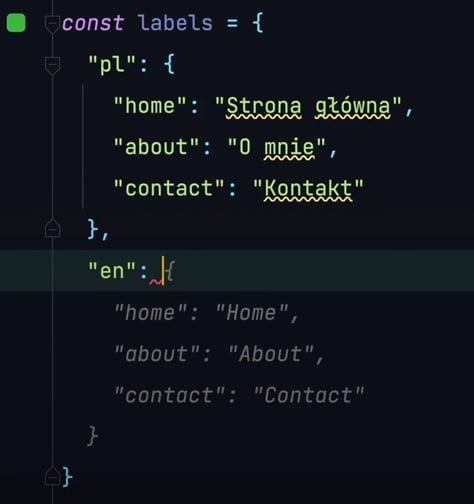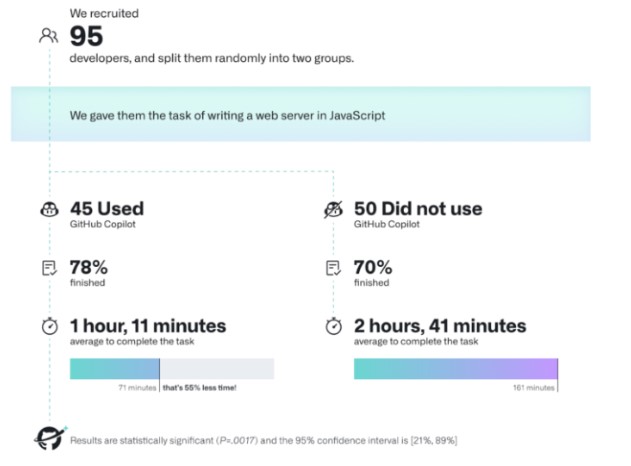GitHub Copilot Pros and Cons

Contents
Is GitHub Copilot the upgrade your coding process needs? We looked into this by examining 32 engineers' experiences. Our findings reveal both boosts in productivity and a few downsides.
In the quest for streamlined workflows, developers have an arsenal of tools and technologies aimed at boosting efficiency. GitHub Copilot, a standout since its 2021 debut, offers more than just a speed boost. It excels by demystifying complex code and easing the transition between different programming languages.
With capabilities ranging from generating boilerplate code to assisting in test-driven development, Copilot exemplifies the growing synergy between human creativity and machine intelligence.
This article will explore the GitHub Copilot benefits and cons, providing real-world use cases to illustrate its role in modern software development.
What is GitHub Copilot?
GitHub Copilot is an AI tool created by GitHub and OpenAI to help programmers write code faster by suggesting lines of code or entire functions. It acts like a coding partner, based on the OpenAI Codex model (a version of the AI models GPT-3 and GPT-4) trained on a wide variety of coding languages and examples from public code.
Copilot can understand the context of the code and generate potentially correct code snippets, functions, algorithms, and even entire classes or files. It interprets comments, docstrings, or the code itself to make suggestions.
The tool is integrated into Visual Studio Code and other development environments through extensions, allowing developers to use it as part of their normal coding workflow.
How does Github Copilot works?
GitHub Copilot works by using a machine learning model, specifically the OpenAI Codex, to understand the context of the code you're working on and generate coding suggestions in real-time. Here's a simplified overview of how it operates:
- Context Understanding: GitHub Copilot reviews your code, comments, and even file names to grasp what you're working on, adapting to different programming languages to match your coding intentions.
- Code Generation: Leveraging its AI training, Copilot predicts and offers relevant code suggestions—from simple lines to complex functions or classes—in real time for a smoother coding experience.
- IDE Integration: Easily integrated into tools like Visual Studio Code, Copilot provides in-the-moment code suggestions you can edit or apply directly, enhancing your workflow and coding speed.
- Public Code Learning: Trained on a broad spectrum of public code, Copilot not only suggests correct code but also popular coding patterns and solutions recognized by the global developer community.
- Adaptation: Although it doesn't learn from your code in real time, Copilot still tailors its suggestions to the current context and your interactions, focusing on relevance and utility.
In essence, GitHub Copilot acts like a very knowledgeable coding partner that suggests possible code completions, speeding up the development process and potentially introducing programmers to new patterns and practices, making it a valuable aid along with other AI tools.
GitHub Copilot pros
GitHub Copilot has several advantages that make it a valuable AI tool for developers across various skill levels and project sizes. Here are some of the key pros:
- Increased Productivity: By suggesting lines of code and complete functions, Copilot can significantly speed up the coding process, allowing developers to focus on higher-level design and problem-solving.
- Wide Language and Framework Support: Copilot is trained on a diverse set of programming languages and frameworks, making it versatile for projects across different tech stacks.
- Learning and Discovery: Developers can learn new coding patterns and discover alternative ways to solve problems by reviewing the suggestions provided by Copilot.
- Code Quality Improvement: By providing feedback on parts of the code or offering optimization suggestions, Copilot can help improve the overall quality of the codebase.
- Efficiency in Boilerplate Code Generation: Copilot excels at generating boilerplate code, which can be tedious and time-consuming to write manually.
- Integration with Popular IDEs: Since Copilot integrates seamlessly with popular Integrated Development Environments (IDEs) like Visual Studio Code, it provides a smooth user experience.
- Help with Learning New Languages: Copilot can act as an on-the-go mentor, offering syntax hints and code snippets that adhere to best practices in the new language.
- Reduction in Coding Errors: While not a replacement for thorough testing, Copilot's suggestions can help reduce common coding errors by providing tested and commonly used solutions.
- Accessibility for Solo Developers and Small Teams: Copilot can serve as an additional 'team member,' offering suggestions and solutions that might not have been considered.
These advantages position GitHub Copilot as a powerful assistant that can enhance efficiency, learning, and code quality for a wide range of development projects.
GitHub Copilot cons
While GitHub Copilot brings numerous benefits to the development process, there are also some limitations and challenges to consider. Here are the key cons:
- Dependency Risk: Relying heavily on Copilot may lead to reduced problem-solving skills and overdependence on automated suggestions among developers, especially beginners.
- Code Quality Variability: While Copilot most often suggests syntactically correct code, the relevance and optimization of the suggestions can vary.
- Learning Curve: Understanding how to effectively use Github Copilot's suggestions and integrate them into a project may require a learning period, especially for complex coding tasks.
- Privacy Concerns: Since Copilot learns from public code repositories, there are concerns about the inadvertent inclusion of copyrighted or sensitive code in its suggestions.
- Subscription Cost: Access to GitHub Copilot may come with a subscription fee, which could be a barrier for individual developers or small startups.
- Limited Understanding of Context: While Copilot is proficient at understanding code context, it may not fully grasp the business logic or specific project requirements, leading to less relevant suggestions.
- Potential for Coding Errors: Automated code suggestions can sometimes introduce errors or security vulnerabilities if not properly reviewed and tested by the developer.
- Intellectual Property Concerns: There's ongoing debate about the intellectual property of the code generated by AI tools like Copilot and its implications for software development.
- Not a Substitute for Human Review: Copilot's suggestions still require thorough review and testing by developers to ensure they meet project standards and quality.
These cons highlight the importance of using GitHub Copilot as an assistant rather than a replacement for human expertise, ensuring developers remain critical and engaged throughout the development process.
GitHub Copilot: pros and cons table
| Pros of GitHub Copilot | Cons of GitHub Copilot |
| Increased productivity: Speeds up the coding process, allowing focus on higher-level tasks. | Dependency risk: May diminish problem-solving skills. |
| Wide support: Versatile for various languages and frameworks. | Variable quality: Inconsistent relevance and optimization of suggestions. |
| Learning aid: Offers insights into new patterns and solutions. | Learning curve: Integration and effective use can be complex. |
| Improves Code Quality: Provides optimization feedback. | Privacy concerns: Risks of including sensitive or copyrighted code. |
| Boilerplate efficiency: Automates tedious coding. | Intellectual property concerns: Uncertainty around the ownership of AI-generated code. |
| Seamless IDE Integration: Works well with environments like VS Code. | Cost: Might be expensive for individuals or small teams. |
| Guide with best practices: Acts as an on-the-go mentor for syntax. | Context limits: May not fully understand project specifics. |
| Reduces errors: Minimizes common coding mistakes. | Error introduction: Suggestions might lead to errors if unchecked. |
| Helps small teams: Acts as a virtual team member. | Requires manual work: Needs thorough testing and validation. |
GitHub Copilot: examples and real cases
Code explanation
Sometimes, especially when working with code created by someone else, the exact way the code works might be blurry. Copilot can explain the code and even give some examples by going step-by-step through the function.
Changing code structure
Copilot can transform code or text to a different structure. This might be helpful when we want to check out different naming convention, generate some repetitive code, convert selectors to page objects or implement review feedback.
Generating new functions or other code
Using GitHub Copilot can generally accelerate the creation of simple functions, although it may not be as precise for more complex tasks. While you can sometimes achieve the desired result through iteration, always verify the function's correctness and understand the generated code carefully.
Generating sample config or spec structure
Whether you're working with new tools or trying something new, Copilot can assist by generating a sample configuration, specification structure, or default usage for a new method.
Code simplification
Unsure whether others will understand your recent creation? Copilot can help by providing feedback and potentially simplifying the code. However, use caution, as suggestions may not always be clearer and can sometimes include unnecessary (or silly) code.
Providing simple translations
AI tools have revolutionized simple text translations. By analyzing massive amounts of translated text, they can understand the nuances of language and translate sentences with a high accuracy. This also means Copilot can help and suggest the upcoming translations.

GitHub Copilot in numbers: outcomes of deploying Copilot?
In a study we conducted on 32 engineers using GitHub Copilot, we discovered notable enhancements in efficiency. The findings revealed an average time-saving gain of 5-10%, marking a significant improvement in productivity. The tool also increased engineer satisfaction by taking over the mundane tasks, allowing these professionals to dedicate more brainpower to tackling complex challenges.
A study led by GitHub Next on Copilot's performance demonstrated tangible benefits. In this experiment, developers using Copilot were 55% faster on average in completing tasks than their counterparts who did not use the tool. Furthermore, the success rate of task completion was higher for the group using Copilot (78%) compared to those without it (70%). These findings underscore Copilot's impact on improving productivity and efficiency in the software development process.
 Github Copilot Summary of the experiment process and results
Github Copilot Summary of the experiment process and results
Some of our engineers’ thoughts about GitHub Copilot:


Is GitHub Copilot right for your development process?
Grasping what GitHub Copilot offers is key for developers looking to boost their workflow and project quality. This tool helps speed up coding, saves mental energy, and lets developers focus on the more creative parts of programming. This means coding becomes more fun and productive.
Yet, adding GitHub Copilot to your process requires a thoughtful approach. Developers need to use their expertise to ensure the AI's suggestions align well with their project's overarching goals and standards. GitHub Copilot is meant to aid creativity and efficiency, not to replace the developer's critical thinking and decision-making.
Alok Ranjan, Software Engineering Manager at Dropbox
By thoughtfully integrating AI with software development, developers can elevate their coding practices, drive innovation, and achieve higher quality outcomes. AI tools like GitHub Copilot blend AI with human expertise to create more efficient and creative coding environments.
